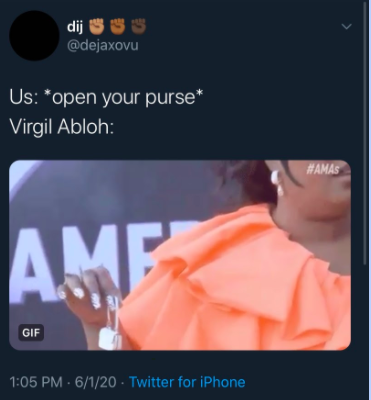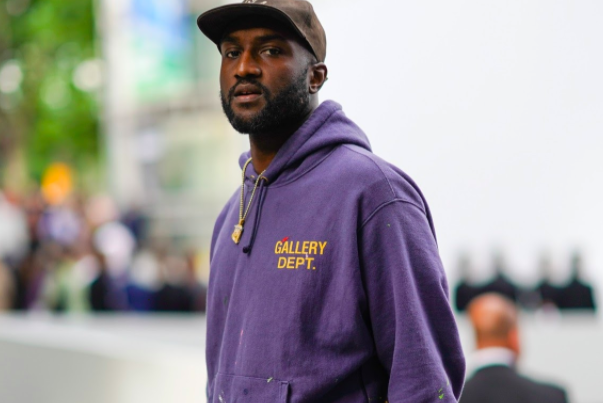Streetwear designer Virgil Abloh criticized for his responses to protests
By Mrinalini Keskar, ‘22
Designer Virgil Abloh has recently been criticized for his responses to the uprisings around the country.
Virgil Abloh has come under fire for giving a meager $50 donation to Fempower’s community bail fund in Miami.
Following the death of George Floyd on May 25, every state in America has held protests demanding a reform in the law enforcement system. As the events of the past two weeks have coalesced into sustained protests for systemic change, social media is filled with resources for people who are interested in educating themselves, gearing up for protests, and getting informed about where to donate.
Many urge those active on social media with big platforms to use them effectively, and this is where celebrities and social media stars find themselves at a critical juncture. The platforms which helped them get a large audience now expose them to people’s expectations, whether it is sharing or resharing resources, amplifying supportive thoughts, or contributing in some tangible way.
While protests have intended to be peaceful, they have not been without violence or looting. In Los Angeles, New York, Chicago, and other cities, organizers have made a deliberate decision to steer protests into affluent commercial areas. Thefts have mostly been from luxury retailers and upscale stores.
In this environment, popular designer Virgil Abloh weighed in on the images that store owner Sean Wotherspoon posted of his raided vintage streetwear shop, Round Two.
Virgil Abloh is the creator of the streetwear brand Off-White. Born to parents who immigrated from Ghana, his seamstress mother sparked his interest in clothing. It was only in 2002, while working at a screen printing shop, that he met the then manager of popular musician Kanye West, propelling him into the fashion and entertainment world. From here, Abloh’s brand Off-White took off, collaborating with brands such as Nike, and he became Louis Vuitton’s creative director in 2018.
“This disgusts me,” he commented on videos Sean Wotherspoon posted of his completely dilapidated store. “You see the passion blood sweat and tears Sean puts in for our culture. The kids that ransacked his store and RSVP DTLA, and all our stores in our scene just know, that product staring at you in your home/ apartment right now is tainted and a reminder of a person I hope you aren’t. We’re apart of a culture together. Is this what you want??”
His message was moralistic. Perhaps as a child of immigrants who arrived in the country with nothing and owned small businesses, he understood the human cost of such destruction.
However, especially in the case of an industry worth over $1 billion, property can be rebuilt, stocks can be replenished, losses can be recouped. From here, followers began questioning his commitment to the Black community, and then Abloh posted a challenge by his friends to his Instagram story, asking him to match a donation of $50. The donation was for (F)empower’s community bail fund, used to bail out protesters in Miami. Twitter users were quick to judge his actions.
Given his success and wealth, many deemed his $50 donation as insufficiently charitable. Critics were quick to point out that not one item from Abloh’s brand Off-White could be purchased with just $50.
Comparisons were also drawn to other big names, such as Drake, who donated over $100,000, which many began to call “200,000 Virgils.”
Soon after receiving backlash, Abloh released a statement, clarifying that he did not intend his comments to seem like his “concern for those stores outweighed concern for our right to protest injustice and express our anger and rage in this moment.” He also highlighted that his $50 matching donation was not the only money he has given; in fact, he has donated over $20,000. Where he has donated was not specified.
Abloh noted that “it’s not just money that solves.” Referring to upcoming projects he is planning and has planned that highlight young Black creatives, he said, “My particular aim is to change opportunities for young kids that look like me to design and ascend to the same position I have.”
Virgil Abloh’s response is a reminder to social media users to refrain from judgements and lead by example.


